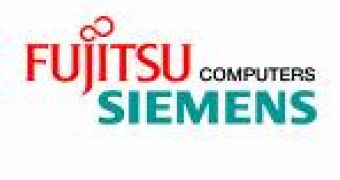Fujitsu Siemens Computers( FSC) launched a new server, the PRIMERGY TX120, and it claims that it is the smallest and quietest server, with a very low power consumption. The Primergy TX120 tower server is aimed at small businesses and offices. FSC suggests that Primergy TX120 is well suited for office workspaces, SOHO applications, back office servers and small office application servers.
The Primergy TX120 is a mono socket dual-core server, the first generation ultra compact tower integrates a powerful Intel Xeon processor and leading edge, low power consumption and space-saving technologies. Because of the new technologies used, the Primergy TX120 has a significantly smaller footprint, the noise is much reduced and energy savings are achieved. The main features and benefits of the Primergy TX120 server are: -reduced active power, down to 163W and even lower when using Celeron processor that translates into a 40% increased energy efficiency; -reduced space and size, fully a third smaller footprint and a fourth less volume occupied so it is well suited for offices and needs no special space to operate; -advanced cooling technologies like "heat-pipe" and "straight line cooling" turn the server into a much quieter machine; -RAID1 and hot-plug HDD, error-proof memory, Xeon UP processor, server operating system pre-installed and integrated Remote Management Controller make from the Primergy TX120 a top of the line server.
Users may customize their server's hardware; a 1.866GHz Intel dual-core Xeon 3040 is available right next to a slower and cheaper Intel Celeron. The server supports up to 8GB of ECC RAM packed in four DIMMs and up to four SAS hot-plug hard-disks in RAID configuration. A 1Gbit Ethernet controller is also integrated.
The TX120 ships with installed software, the FCS's Server View remote management tool allows admins to control the system from a distance. Available operating systems include Windows, Novell SUSE, Red Hat Linux and SCO OpenServer.

 14 DAY TRIAL //
14 DAY TRIAL //